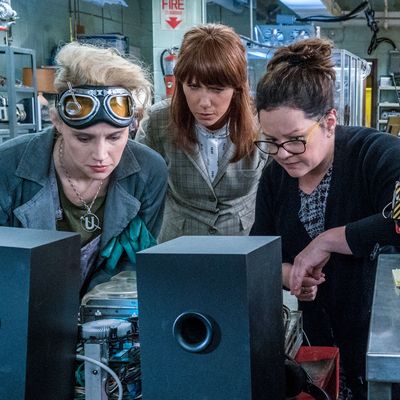
Small Ghostbusters spoiler ahead.
Audiences laugh differently at different types of jokes. There is a collective laugh that sounds like a pop gun — just a quick burst of noise, often reacting to a simple, short sight gag. There’s the laugh followed by an “OooOOOoOO” noise, when an audience perceives a given bit as edgy. There is a rolling, shouting sort of laugh that comes during a prolonged, shocking scene, like you might see in a Sacha Baron Cohen movie. And then there’s the type of laugh I heard not long into the screening of Ghostbusters that I attended. It was a laugh that sounded like an exhale.
It came about 20 minutes into the movie, in the scenes after Melissa McCarthy, Kate McKinnon, and Kristen Wiig had encountered their first ghost. Wiig, who had just been vomited on by that apparition, excitedly screams, into McCarthy’s video camera, that ghosts are real. McCarthy then puts the video on YouTube, and, soon after, she and Wiig break the first rule of mental sanity in the digital age: They read the comments. McCarthy wants to show Wiig a note from someone else who saw a spook, but Wiig, not knowing where to look, slowly reads the first comment she sees: “Ain’t no bitches gonna hunt no ghosts.”
The audience laughed, and gave a sort of sigh of relief. The joke very subtly breaks the fourth wall to assert that what is happening in the movie — female ghostbusting — isn’t a crazy idea, whereas complaining about it is. By calling out the absurd controversy surrounding the film, director Paul Feig & Co. knock it down and make it easier to ignore.
It’s a move you’ll see often in live comedy. Any time there’s a distraction at a show, whether it’s an audience member talking more loudly than they realize, a stumbling drunk, heckler, or famous person simply in attendance, a good comedian will quickly draw attention to it. And, no matter what the comedian actually says, the audience will typically laugh in appreciation. Calling out an elephant in the room tends to make the elephant seem smaller, often to the point where it can be disregarded. The dudes who made the Ghostbusters trailer the most-hated ever are essentially hecklers; this joke is the film’s “destroy a heckler” moment.
You’ll see a similar move in the jokes that comedians use to open their sets, with the comic promptly acknowledging something seemingly notable about their appearance so the audience doesn’t have to think about it. For a while, Nick Kroll would start out by saying he looked like Harry Potter crossed with Jeff Goldlbum, just so the audience didn’t spend his set thinking, Who does this guy remind me of? Does he know what he looks like? Similarly, Jackie Kashian, one of the best stand-ups currently working, used to open with, “I am overweight. You may consider that addressed.”
In the case of this Ghostbusters joke, it reminded me of the HBO special Quincy Jones taped after learning he had terminal cancer. He opened with a joke about the attention and opportunities he was receiving because of his illness, ending with, “I feel pressure to die.” When I later interviewed him about the joke, he explained, “I chose that one because I wanted to hurry up and address the elephant in the room. I didn’t want it to be a cancer special.”
Comedy doesn’t do well with baggage — it puts people in their heads. And Ghostbusters has been weighed down with baggage since we knew it existed, turning a light comedy into a political statement. It was too much. I have a friend who isn’t going to see the movie because she’s weary of all the conversation around it. The “Ain’t no bitches gonna hunt no ghosts” was the movie’s way of saying “consider that addressed.” And at least in my screening, it worked. Not only was it funny, it also returned a lightness and swagger to the film. That’s when we knew we could laugh about everything that had been happening; that this Ghostbusters ain’t afraid of no bros.


